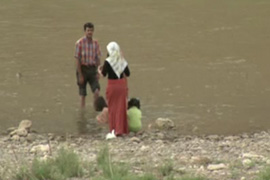UN urges action on water policies
Al Jazeera’s Anita McNaught says an international forum hopes for new thinking.

 |
| Activists say mismanaged water supplies put populations in Africa and elsewhere at risk [GETTY] |
More than 20,000 delegates and unofficial participants representing 150 countries are expected to converge on Istanbul, Turkey, to attend the fifth World Water Forum, the world’s most significant water policy and discussion event.
The forum, this year called “Bridging the Divides for Water”, is expected to host a week of urgent debate.
While world leaders are currently focusing on the global financial crisis and declining oil reserves, a predicted water crisis could prove more acute and more devastating.
| Your Views |
|
“If you privatise water, would that make putting out buckets to catch rain stealing?” Send us your views |
A UN report, released to coincide with the forum, paints a grim future for the planet’s fresh water supplies.
The forum will also host an increasingly determined opposition movement which is questioning international water policies and warning of the dangers of private, corporate control of the world’s water resources.
“Water is a political issue,” said Daniel Zimmer, the associate director of the World Water Council, an international body representing the water industry, and the organisers of the forum.
“But politicians need to understand why they should care more about water,” he said.
Depleting freshwater
The UN report “Water in a Changing World” warns that increases in population and climate change, coupled with demands for more food and energy production, are depleting the planet’s finite freshwater supply at an unsustainable rate.
The report says that mismanagement of water resources has created “enormous” problems. Unless these problems are addressed, this will lead to global “political insecurity and conflict at various levels” in the coming decades.
“Action is required now,” the UN report has urged.
The organisers of the World Water Forum say this is precisely why the five-day event – which takes place every three years – is an important event, bringing together policy-makers from all over the world.
Organisers are hoping that government ministers and local authorities among the more than 150 national delegations attending the forum will set themselves new targets and make public pledges at the end of the week’s discussions.
They hope these in turn will lead to new initiatives when the delegations return home.
Ger Bergkamp, the director of the WWC, said: “There is now urgency to act. We need common views on how to move forward”.
Criticising the forum
 |
| WWC officials say that water is a political issue [AFP] |
But ‘water justice activists’ say the World Water Forum was misconceived from the outset, and has a hidden agenda favouring commercial intervention.
They say the advice policy-makers will be getting from many senior participants at the event will favour exploitation rather than conservation.
Ufuk Uras, a Turkish MP from the Freedom and Solidarity Party, said: “It’s become an issue of the selling and buying of water. There’s a fair that’s going on and when you see the participating companies that are there, it becomes an issue of supply and demand.”
The Canada-based Polaris Institute, one of more than 270 activist groups who have come to Istanbul to participate in the ‘official’ forum, is also holding its own discussion and advocacy events like the ‘Istanbul Water Tribunal’, and ‘The Alternative Water Forum’.
“When you look at the themes set down for discussion in some of the sessions, the alarms go off,” said Richard Girard from the Polaris Institute.
He said some topics on the forum’s agenda such as “Sustainable means of financing local water authorities and systems” and “Optimising Public and Private Roles in Water Services” are particular cause for concern.
Groups such as the Polaris Institute say that privatisation of the management and delivery of water should not be a substitute for sustainable local policy, run by local people.
They say the failure of many countries and municipalities to manage their water supplies should not be used as an excuse to outsource management to private companies instead.
They take issue with the concept of water becoming part of a profit-based equation. Water, they say, is a human right, not a commodity, and while governments need to dramatically improve their performance, using business models is not the right way.
Girard warns that bottled water is the “thin end of the wedge” in the creeping manage-for-profit trend.
“You get people used to paying for their drinking water, and then they are more likely to accept privatisation,” he said.
Turkey’s water
Environmentalists and some politicians in Turkey share the same concerns.
Critics of both previous and current Turkish government policies claim that large-scale water ‘development’ projects have both exacerbated poverty and social problems, and failed to deliver promised economic dividends.
Despite years of accelerated development and an outward appearance of prosperity, the water coming out of the taps in Turkish cities is considered by many to be unsafe to drink.
And a whole delivery industry has grown out of Turks’ need to buy drinking water in containers.
Multi-national companies like Danone and Nestlé have opened highly-profitable bottling and distribution businesses – at this stage, in partnership with local companies. But Turkish environmentalists warn this is just the beginning of a shift in government policy.
“This is not a technical choice, it’s a political choice,” Uras said.
He warned of new water legislation coming after provincial elections at the end of March which he believes will open up Turkey’s rivers and lakes to commercial control.
Looming water crisis
 |
| Experts say that Turkey may be facing a water crisis after a drought last year [AL JAZEERA] |
Turkey is only slowly waking up to the fact that it, too, has a looming water crisis.
Last summer’s regional drought led to unprecedented water failures in the capital Ankara, while fast-disappearing aquifers in the country’s agricultural heartlands are now threatening crop production.
Turkish activists are worried that the government, which is believed to be desperately seeking a quick fix, may simply throw the country’s resources open to companies it believes know better.
But Turkish experience in corporate involvement and grand-scale engineering of its water resources has been mixed at best.
Almost a quarter of the country’s electricity is derived from hydro-electric schemes which have required damming, often multiple times, the country’s many rivers. The collateral damage has been enormous in terms of population displacement, habitat destruction, and ultimately water loss and degradation in the wider area around the dams.
But a body of professional opinion is now gaining momentum that most dams do not make economic sense.
Some experts believe that the cost of building them outweighs the gains from power generation and irrigation. And that the adverse consequences have fallen most heavily on the country’s poorest.
Favouring dams
However, Turkish government policy is still solidly in favour of building dams.
Tahir Ongur from the Turkish Chamber of Geology Engineers, said: “To the government ministers involved, they represent progress and civilisation.”
He said: “We know enough now, about whether dams are good or bad. We know they are bad. But the government doesn’t understand it.”
Nor does the Turkish public yet fully appreciate what is happening, laments Ulrike Dufner The Heinrich Boll Foundation, an NGO.
“The dams are far away, in rural areas. In Istanbul, they don’t care. As long as they get their cheap electricity and water comes out of the taps, it’s okay.”
For further information on water policies:
The World Water Forum
The Alternative Water Forum